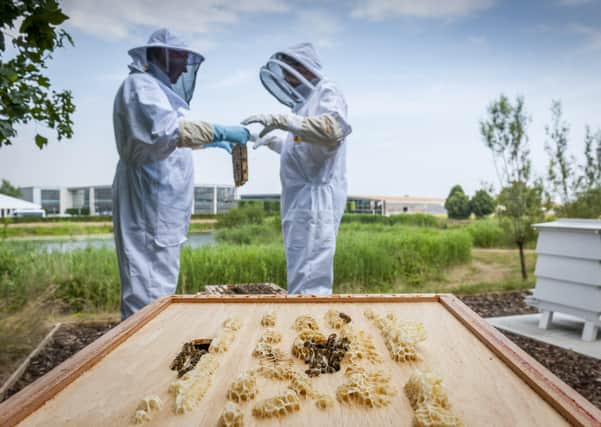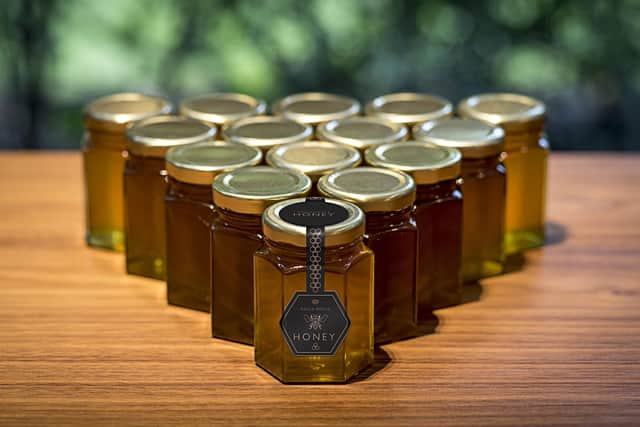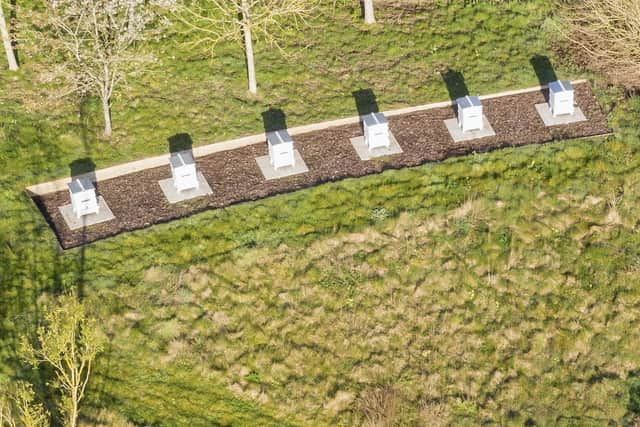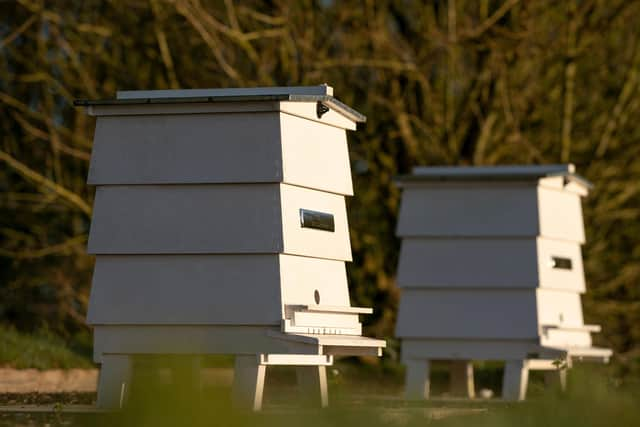Buzz of activity at the Home of Rolls-Royce sees record production of ‘world’s most exclusive honey’


In their third full season of production, the dedicated 250,000-strong workforce in the company’s Apiary are set, once again, to exceed their 2020 volume targets for the ‘Rolls- Royce of Honey’.
Having come through the winter in excellent health, Rolls-Royce’s English Honey Bees are currently emerging from their hives and foraging on the half-a-million trees, shrubs and wildflowers flourishing across the 42-acre RollsRoyce site, plus the eight acres of sedum plants growing on the manufacturing plant’s ‘living roof’ – the largest of its kind in the UK.
Advertisement
Hide AdAdvertisement
Hide AdThe more adventurous bees make sorties into the surrounding Goodwood Estate, whose 12,000 acres of West Sussex countryside are among the glories of the South Downs National Park.


Established in 2017, the Goodwood Apiary comprises six traditional, English-crafted, wooden beehives, each bearing a polished stainless steel nameplate handcrafted in the company’s Bespoke Workshop.
Five are named after cars in the Rolls-Royce product family – ‘Phantom’, ‘Wraith’, ‘Ghost’, ‘Dawn’ and ‘Cullinan’ – while the sixth, the ‘Spirit of Ecstasy’, celebrates the marque’s illustrious mascot.
Like the 2,000 employees at the Home of Rolls-Royce, the bees are responsible for producing a rare and desirable product.
Advertisement
Hide AdAdvertisement
Hide AdAt the end of each season, ‘The Rolls-Royce of Honey’ is meticulously handprocessed by local specialists and served to guests of the marque, including customers commissioning their motor cars in the company’s Atelier suite.


The Apiary project is Rolls-Royce Motor Cars’ response to the real and present threat facing Britain’s Honey Bee population.
Honey Bees are the principal pollinators of numerous tree and plant species, including many of the fruit and vegetable crops that are crucial to the local agricultural economy around the Home of Rolls-Royce.
However, a shortage of suitable forage, primarily caused by habitat loss, has put their numbers under great and growing pressure in recent years.
Advertisement
Hide AdAdvertisement
Hide AdThe South Downs National Park, on the doorstep of the Home of Rolls-Royce, mirrors this national trend.


Chalk downland, which supports pollinators including honey bees, bumblebees and the Adonis blue butterfly, now accounts for just four per cent of the National Park’s total area, in fragmented pockets that make it harder for pollinators to move through the landscape.
Through providential timing, the creation of the Apiary gave an early boost to a new South Downs National Park Trust campaign to address this critical problem.
The Bee Lines initiative supports farmers and landowners in creating new flower-rich ‘corridors’ to link areas of habitat and help bees and other pollinator species to thrive.
Advertisement
Hide AdAdvertisement
Hide AdResidents and businesses within the National Park boundaries are also being encouraged to get involved through initiatives such as planting wildflowers in gardens and grounds.
“The Apiary further underlines our commitment to the environment, which informs everything we do at Goodwood,” says Richard Carter, Director of Global Communications at Rolls-Royce Motor Cars.
“Our sustainable buildings, thermal ponds, rainwater management systems and wildfowl refuge have already made the Home of Rolls-Royce at Goodwood one of the UK’s most eco-friendly manufacturing facilities.
“Through this project, which taps into the biodiversity of our site, including our huge living roof, we’re making an important contribution to conserving Britain’s vital bee population.”
A message from the Editor, Gary Shipton:
Advertisement
Hide AdAdvertisement
Hide AdIn order for us to continue to provide high quality and trusted local news, I am asking you to please purchase a copy of our newspapers.
With the coronavirus lockdown having a major impact on many of our local valued advertisers - and consequently the advertising that we receive - we are more reliant than ever on you helping us to provide you with news and information by buying a copy of our newspapers.
Our journalists are highly trained and our content is independently regulated by IPSO to some of the most rigorous standards in the world. But being your eyes and ears comes at a price. So we need your support more than ever to buy our newspapers during this crisis.
Stay safe, and best wishes.